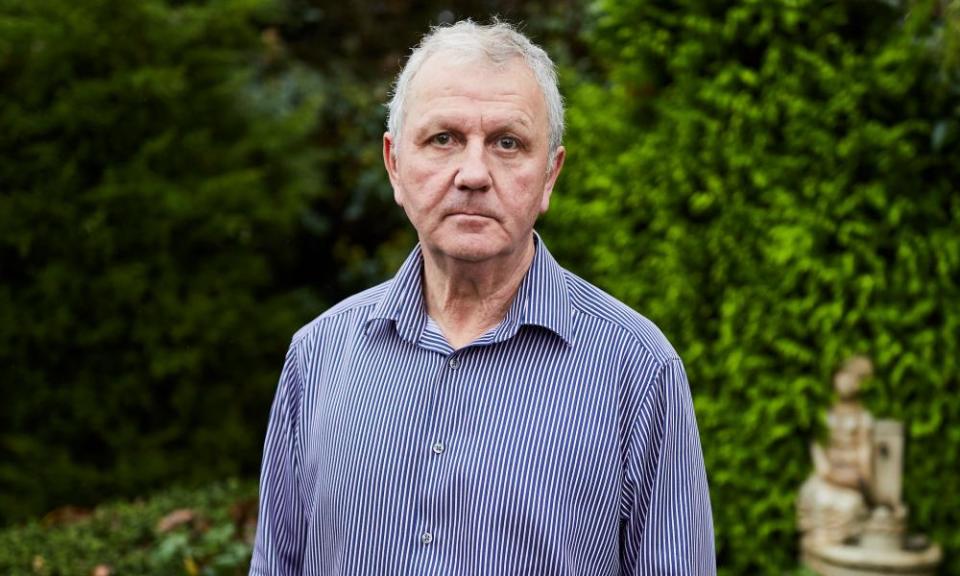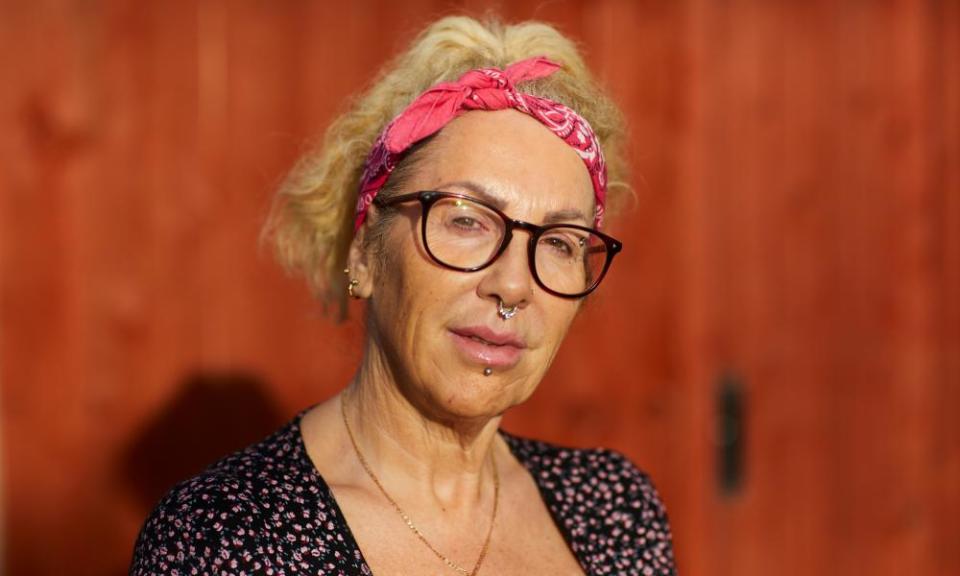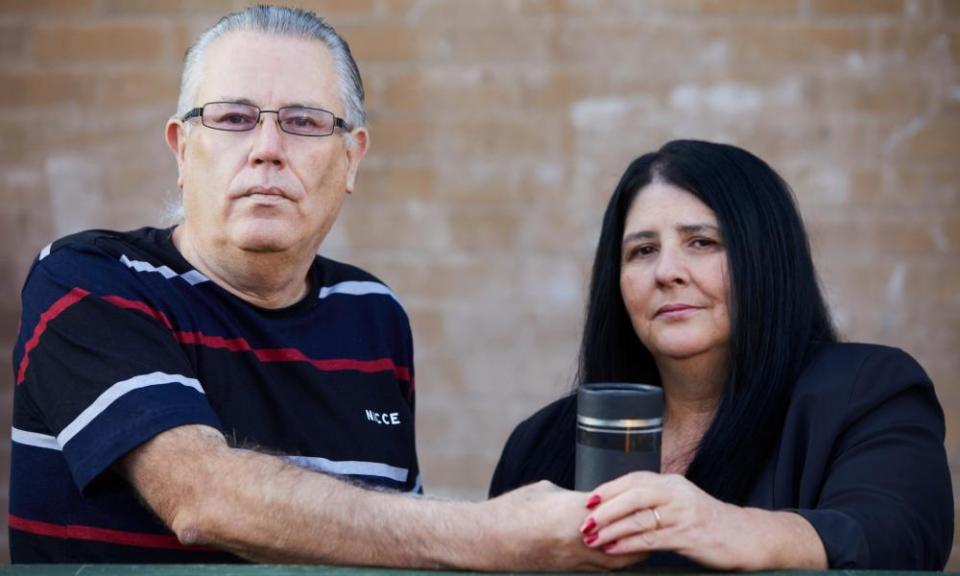'We can't grieve': online forum where Covid bereaved feel they can share
Locked behind Facebook’s privacy settings lies what Tony Fitzgerald calls an “exclusive members’ club none of us wanted to join”.
The online forum of more than 2,000 people bereaved by coronavirus is a place where the 65-year-old regularly logs on after the death of his wife from Covid-19 in April. Another member describes the forum as “a secret society”, a place where the bereaved can drop the “just about OK face” they manage in public and let the “crumbling face” of grief show.
Fitzgerald, a father of two from Haydock still haunted by the trauma of his wife Ann’s death, connects with people like Sylvia Bahsoon, whose father, Salim, died from coronavirus. Bashoon logs on “when I’ve been feeling so sad my heart is about to pop”.

Sioux Hill, whose father, John, died after contracting the virus, says she chats more to people in this group than her family and friends. Shelly Weeks, 47, reeling from the death of her husband, Roy, 73, in April reckons the site has saved her life “more than once”.
This virtual support network is the unseen heart of the Covid-19 Bereaved Families for Justice UK group. In public, it lobbies for a judge-led public inquiry into the government’s handling of the pandemic and calls for funding for bereavement counselling. But in private it is a different story. About 60 members agreed to give the Guardian a glimpse inside the peculiar, painful and often shocking reality of Covid bereavement.
On a Facebook chat they poured out their experiences. There is the trolling from people who refuse to accept the virus killed their loved ones. Forum members get called “sheep” for accepting coronavirus caused their loved one’s death and people online demand to see death certificates. One member had conspiracy theories yelled at her in a supermarket.
They speak with a raw frankness about the reality of their loved ones’ deaths rarely heard in the national Covid conversation. For example, the anguish of sealed coffins and not being able to dress the deceased. And there is a powerful feeling they are out of step with the rest of the country as it obsesses over tiers and Christmas gatherings that seem to many “insane”. It is as if society, in a kind of collective fight-or-flight mode, remains in denial of the pain caused by Covid deaths.
Jo Goodman set up the group in April after her father’s death was mentioned in an article online. She was disturbed to see comments suggesting he would have died anyway or that she should be blaming the Chinese government. There was one sympathetic comment, by Matt Fowler, who was also bereaved and the pair agreed on the need for a place only for Covid families.
“Sometimes it feels like you’re living in an alternate reality to others,” said Goodman. “To them it’s been disruptive and difficult but to us it’s been world-shattering. My phone has popped up and there have been 598 deaths in the past 24 hours. Only people who’ve lost someone know how hearing that kind of thing just makes your stomach turn, knowing all the families behind the numbers. Knowing this is still going on is a kind of ongoing trauma so being around people who understand is so important.”
Too often relatives and friends don’t understand. Becky from west London, whose 77-year-old father died from the virus, was reduced to tears when a friend boasted she and her parents had not been following the lockdown rules. “It seemed so hard-hearted as she knew how devastated I felt not being able to say goodbye to him.” Emma in Kent split from her boyfriend of 18 months because “he questioned my father’s death and said it couldn’t possibly be Covid as it didn’t exist”.
Covid grief has a different quality, says Weeks, whose mother and father died in 2017 and 2019.
“I grieved and still do, but they had a proper funeral, they had a wake, all the family united and spoke about the good times,” she says. When her husband died in April the funeral was “stark”.
“Ten chairs were spaced out in the crematorium and it felt surreal and impersonal. There were no family hugs outside whilst I collapsed in grief … the darkness that swept over me, the shock that I would never hold my husband ever again.”

The Facebook group is “like a comfort blanket” to her. She checks in at all times of the day and night, as does Karen Fraser-Knight, 55, from Widnes, whose twin sister, Paula died from coronavirus.
“It’s more like a trauma than grief,” says Fraser-Knight. “[Covid is] the topic of conversation, it’s in the papers, on TV, it’s a constant … so we will never be able to move on from this. I have flashbacks to what my twin must have gone through. Because I wasn’t allowed to be with her, say goodbye to her, arrange her funeral as she wanted. We can’t grieve … we live in this perpetual state of Covid trauma.”
It is a “safe” place where others understand the peculiarities of Covid grief and free from trolls, users said. But not everyone finds the forum always helpful.
“The group itself, while incredibly supportive, can also be triggering as I read the stories of loss and pain that others have suffered,” says Rivka Gottlieb, whose father, Michael, died from the virus. “I have had to limit the amount of time I spend reading posts.”
Covid-19 Bereaved Families for Justice is a place for solutions as well as sharing. Its representatives have met with the Labour leader, Kier Starmer, and provided evidence to Amnesty International’s study into care home deaths. Its members help each other practically – for example obtaining loved ones’ medical notes. It is a channel for anger at government failures, such as the timing of the first lockdown in March some feel cost lives. And it is a community that can share a sense of horror at this autumn’s resurgent death toll.
But ultimately it is a shelter from a country not ready yet to face the scale and unique shape of Covid bereavement.

From his home in Tamworth, Mark Jennings logs on daily. His brother Nigel, 54, died in April after catching coronavirus while in hospital and then his older brother, Colin, 59, died seven weeks later having been diagnosed with lung cancer. Jennings believes Covid contributed to Nigel’s death too.
“I check in every day, look at all the lost souls, read the heart-wrenching stories; everyone searching for answers or someone to listen,” he said. “I cry, pray and yearn for this not to be true. Reality strikes, then it’s diazepam, endless dreams and maybe two hours of sleep.”
Beside his bed he keeps two small phials. They contain his brothers’ ashes.


